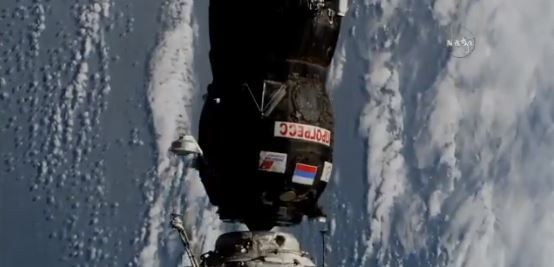
An unmanned Russian space vehicle made record time on its voyage to the International Space Station Monday.
The cargo ship, called the Progress 70, made the trip from the Earth's surface to its final destination in under four hours, quicker than a drive from to New York City to Washington D.C. or Boston. The ship carried with it nearly half of a ton of water and 3,450 pounds of food and supplies, according to NASA.
The mission was launched from the Russian space complex, Baikonur Cosmodrome, in Kazakhstan, just before 6 p.m. EST and docked just after 9:30 p.m. EST, according to the Canadian Broadcasting Corporation.
The supply mission beat the previous fastest trip of six hours. Russia had attempted to set the record earlier this year and last year, but delays caused the missions to miss the most optimal launch window, according to Space.com. The Progress 70 spacecraft is disposable and the outlet reported that it will stay with the space station until 2019, when it will be filled with trash and then jettisoned, to be destroyed by Earth's atmosphere.
The Progress 70 flew to space on a Russian Soyuz rocket.
"The less-than-four-hour trip will demonstrate an expedited capability that may be used on future Russian cargo and crew launches," NASA said in a statement about the launch.
Other cargo launches can take at least two days. SpaceX, which also provides supply runs to the space station, sent a vehicle there earlier this month that took three days to complete its journey, according to the Associated Press. SpaceX's Dragon capsule, launched from Cape Canaveral, Florida, orbited the Earth several times before meeting up with the space station.
In order to avoid the longer orbit cycle, the International Space Station had to begin adjusting its orbit in June to accommodate the mission, according to The Verge.
There are currently six astronauts stationed at the space station from various countries. Three, including the station's commander, Drew Feustel, are Americans. The other NASA astronauts are Arnold and Serena Aunon-Chancellor. Alexander Gerst, a German from the European Space Agency, and two Russians, Oleg Artemyev and Sergey Prokopyev, are also on the station.
President Donald Trump's administration proposed eventually phasing out the U.S.'s monetary support of the International Space Station earlier this year. The hope is that commercial enterprise will take over elements of the International Space Station freeing up NASA to focus on deeper space missions.
Uncommon Knowledge
Newsweek is committed to challenging conventional wisdom and finding connections in the search for common ground.
Newsweek is committed to challenging conventional wisdom and finding connections in the search for common ground.
About the writer
New York-based reporter and visual journalist.
To read how Newsweek uses AI as a newsroom tool, Click here.








